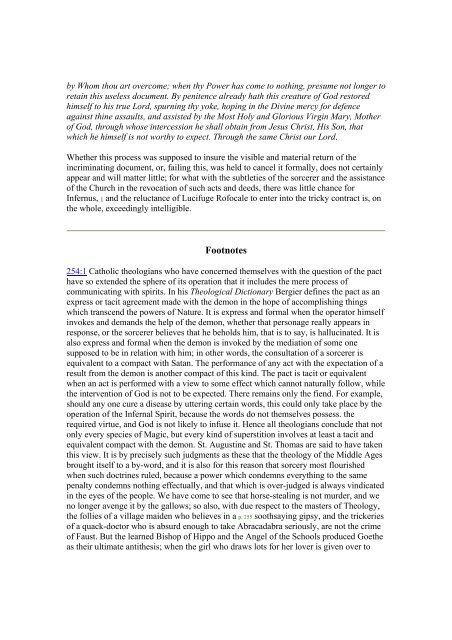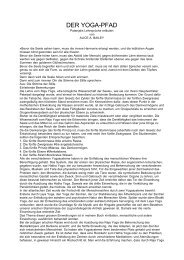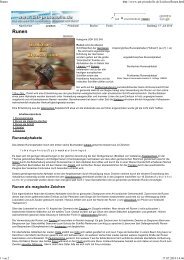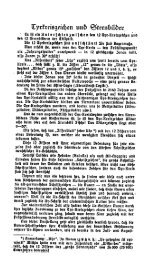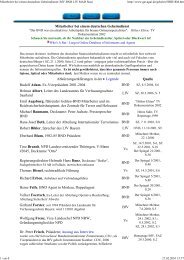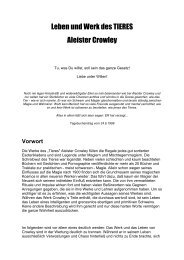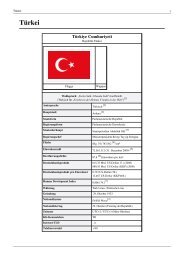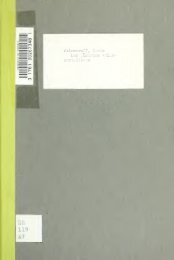The Book of ceremonial Magic
The Book of ceremonial Magic
The Book of ceremonial Magic
Create successful ePaper yourself
Turn your PDF publications into a flip-book with our unique Google optimized e-Paper software.
y Whom thou art overcome; when thy Power has come to nothing, presume not longer to<br />
retain this useless document. By penitence already hath this creature <strong>of</strong> God restored<br />
himself to his true Lord, spurning thy yoke, hoping in the Divine mercy for defence<br />
against thine assaults, and assisted by the Most Holy and Glorious Virgin Mary, Mother<br />
<strong>of</strong> God, through whose intercession he shall obtain from Jesus Christ, His Son, that<br />
which he himself is not worthy to expect. Through the same Christ our Lord.<br />
Whether this process was supposed to insure the visible and material return <strong>of</strong> the<br />
incriminating document, or, failing this, was held to cancel it formally, does not certainly<br />
appear and will matter little; for what with the subtleties <strong>of</strong> the sorcerer and the assistance<br />
<strong>of</strong> the Church in the revocation <strong>of</strong> such acts and deeds, there was little chance for<br />
Infernus, 1 and the reluctance <strong>of</strong> Lucifuge R<strong>of</strong>ocale to enter into the tricky contract is, on<br />
the whole, exceedingly intelligible.<br />
Footnotes<br />
254:1 Catholic theologians who have concerned themselves with the question <strong>of</strong> the pact<br />
have so extended the sphere <strong>of</strong> its operation that it includes the mere process <strong>of</strong><br />
communicating with spirits. In his <strong>The</strong>ological Dictionary Bergier defines the pact as an<br />
express or tacit agreement made with the demon in the hope <strong>of</strong> accomplishing things<br />
which transcend the powers <strong>of</strong> Nature. It is express and formal when the operator himself<br />
invokes and demands the help <strong>of</strong> the demon, whether that personage really appears in<br />
response, or the sorcerer believes that he beholds him, that is to say, is hallucinated. It is<br />
also express and formal when the demon is invoked by the mediation <strong>of</strong> some one<br />
supposed to be in relation with him; in other words, the consultation <strong>of</strong> a sorcerer is<br />
equivalent to a compact with Satan. <strong>The</strong> performance <strong>of</strong> any act with the expectation <strong>of</strong> a<br />
result from the demon is another compact <strong>of</strong> this kind. <strong>The</strong> pact is tacit or equivalent<br />
when an act is performed with a view to some effect which cannot naturally follow, while<br />
the intervention <strong>of</strong> God is not to be expected. <strong>The</strong>re remains only the fiend. For example,<br />
should any one cure a disease by uttering certain words, this could only take place by the<br />
operation <strong>of</strong> the Infernal Spirit, because the words do not themselves possess. the<br />
required virtue, and God is not likely to infuse it. Hence all theologians conclude that not<br />
only every species <strong>of</strong> <strong>Magic</strong>, but every kind <strong>of</strong> superstition involves at least a tacit and<br />
equivalent compact with the demon. St. Augustine and St. Thomas are said to have taken<br />
this view. It is by precisely such judgments as these that the theology <strong>of</strong> the Middle Ages<br />
brought itself to a by-word, and it is also for this reason that sorcery most flourished<br />
when such doctrines ruled, because a power which condemns everything to the same<br />
penalty condemns nothing effectually, and that which is over-judged is always vindicated<br />
in the eyes <strong>of</strong> the people. We have come to see that horse-stealing is not murder, and we<br />
no longer avenge it by the gallows; so also, with due respect to the masters <strong>of</strong> <strong>The</strong>ology,<br />
the follies <strong>of</strong> a village maiden who believes in a p. 255 soothsaying gipsy, and the trickeries<br />
<strong>of</strong> a quack-doctor who is absurd enough to take Abracadabra seriously, are not the crime<br />
<strong>of</strong> Faust. But the learned Bishop <strong>of</strong> Hippo and the Angel <strong>of</strong> the Schools produced Goethe<br />
as their ultimate antithesis; when the girl who draws lots for her lover is given over to


